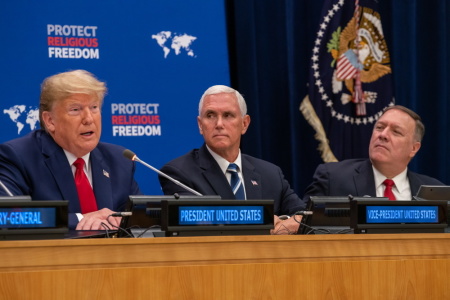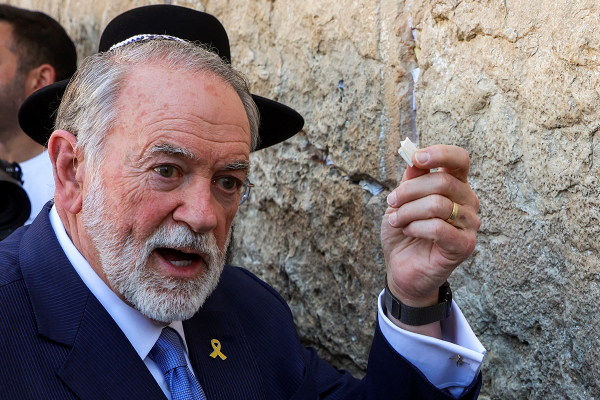Religious liberty is in the Bible

At his third visit to the United Nations General Assembly, President Trump impressed upon world leaders the importance of religious freedom, a topic rarely discussed at the U. N. Specifically, the president noted that “80 percent of the world’s population lives in countries where religious liberty is in significant danger or even completely outlawed.” (He focused extensively on China and Iran). He promised “Americans will never tire in our effort to defend and promote freedom of worship and religion.”
President Trump also became the first sitting president to host a U.N. meeting on religious freedom. At this event, he challenged other nations to combat religious persecution. He also emphasized the need to protect places of worship and announced the United States will dedicate $25 million to protect religious freedom, religious sites, and relics.
Many in the mainstream media widely panned the president’s advocacy for America’s historic values. Politico dismissed the speech’s focus on religious liberty as merely an “appeal to his evangelical supporters.” The Associated Press seemed to dismiss religious liberty as simply “an issue that resonates with his evangelical supporters.” When did religious liberty become so divisive?
America’s commitment to religious liberty, both at home and abroad, has not always been controversial. As recently as 1993, Congress overwhelmingly passed the Religious Freedom Restoration Act (RFRA) (the law passed unanimously in the House and by a 97-3 vote in the Senate and was signed into law by President Clinton).
Despite longstanding bipartisan support, two societal trends have made calls to restrict religious liberty increasingly common. First, as America’s religious landscape has become more secular, there is no longer a consensus about the role of religion in public life. Second, as society has moved away from a biblical understanding of marriage and human sexuality, historical, Christian beliefs on these topics are increasingly seen as outdated, or worse, hateful.
As a result of these trends, even some Christians have a poor understanding of religious liberty. There is a growing perception that support for religious liberty is a pretense for codifying prejudice and bigotry into law. Therefore, Christians who care about preserving religious liberty must articulate more persuasively why protecting everyone’s religious beliefs and practices serves all people.
As I argue in the booklet, “Biblical Principles for Religious Liberty: Evidence from Scripture and Church History,” Christians should support religious liberty because it’s in the Bible.
In short, the Bible teaches that salvation is the work of the Holy Spirit and that force or coercion is futile in bringing about true belief. The Bible envisions a society where religious liberty is respected and individuals make their own choices when it comes to religion. In other words, faith cannot be coerced. The state oversteps its God-ordained role when it tries to enforce a theological perspective onto its citizens.
We see the distinction between church and state in Jesus’ answer to the Pharisees in Matthew 22:21, where Jesus says, “Render to Caesar the things that are Caesar’s and to God the things that are God’s.” Although Caesar should be respected and obeyed in areas where he has legitimate authority, Caesar (who represents the state) cannot require preeminent allegiance. Because man’s soul is directly accountable to God, it must be given freedom to pursue worship according to the dictates of conscience.
Therefore, the state has no authority to determine the correct faith. Through the parable of the tares in Matthew 13, Jesus teaches that at the end of the age God will separate believers from unbelievers. It is God, not the state, who is responsible for judging true belief.
This teaching is lived out implicitly in the lives and ministry of the apostles. For example, in Acts 17-19, Paul reasons with his hearers. He never lashes out or tries to force anyone to embrace his teaching. Rather, he patiently explains his beliefs and trusts the Holy Spirit to bring repentance and faith.
The Bible teaches that salvation is a spiritual matter and must be embraced willingly. Thus, the state should provide freedom in the area of religion. Moreover, because religion is more than just subscription to private beliefs but encompasses all of one’s life, the exercise of religion should be protected as broadly as possible.
These principles, derived from the Bible, are good for all people. Everyone flourishes when they can follow the dictates of their own conscience and align their lives in accordance with their most deeply held beliefs. But as evident from the negative reaction to President Trump’s U.N. speech, Christians must continue to articulate why a broad understanding of soul freedom serves all people.





















